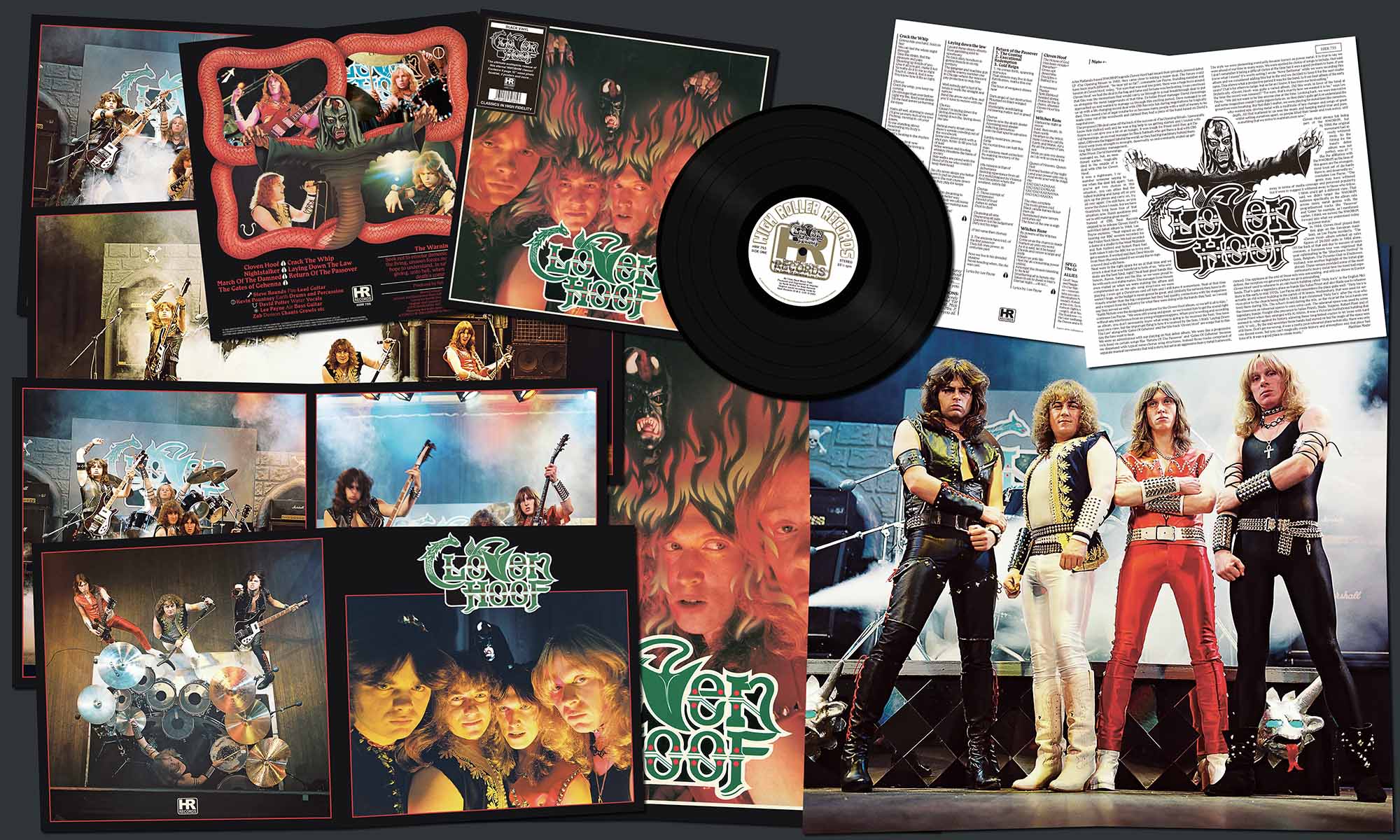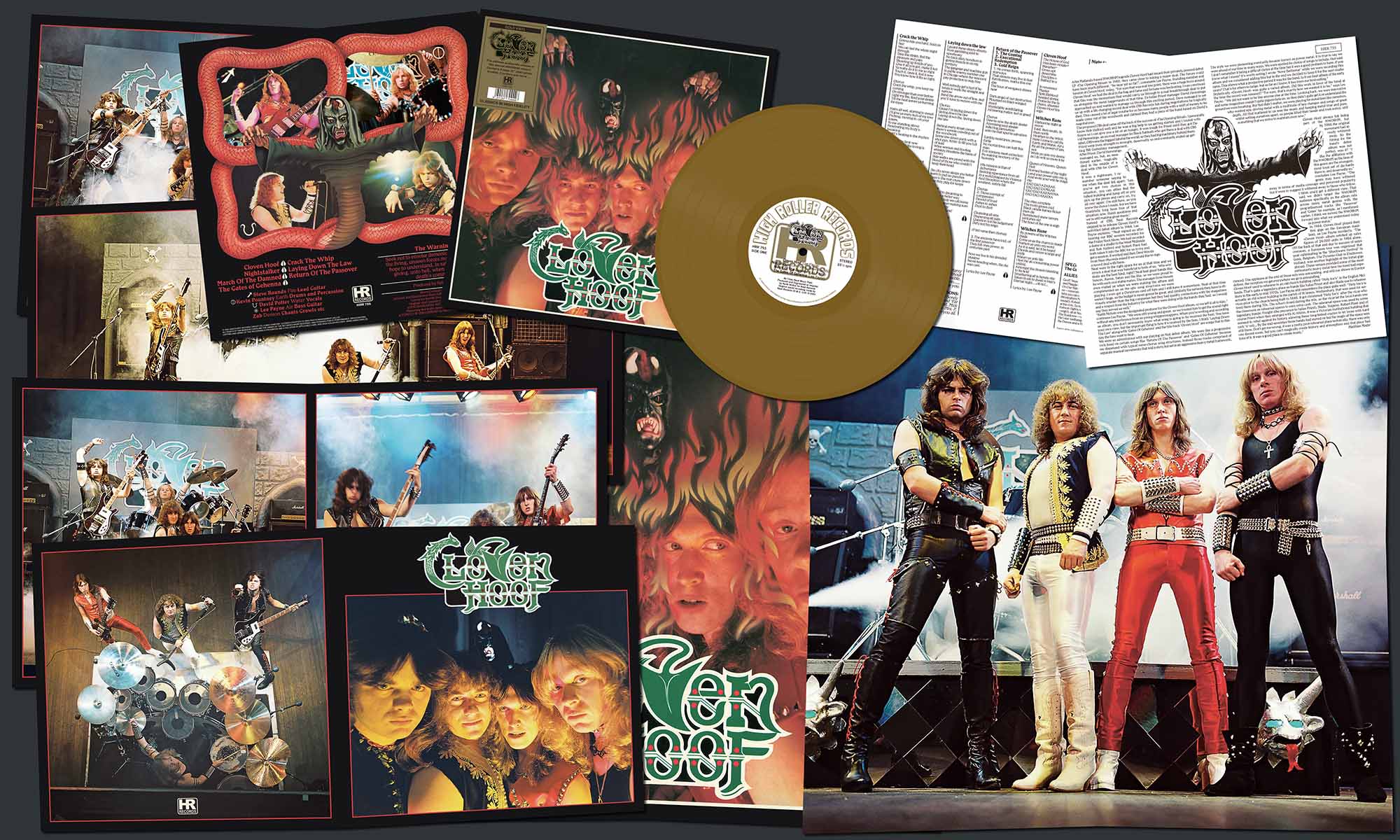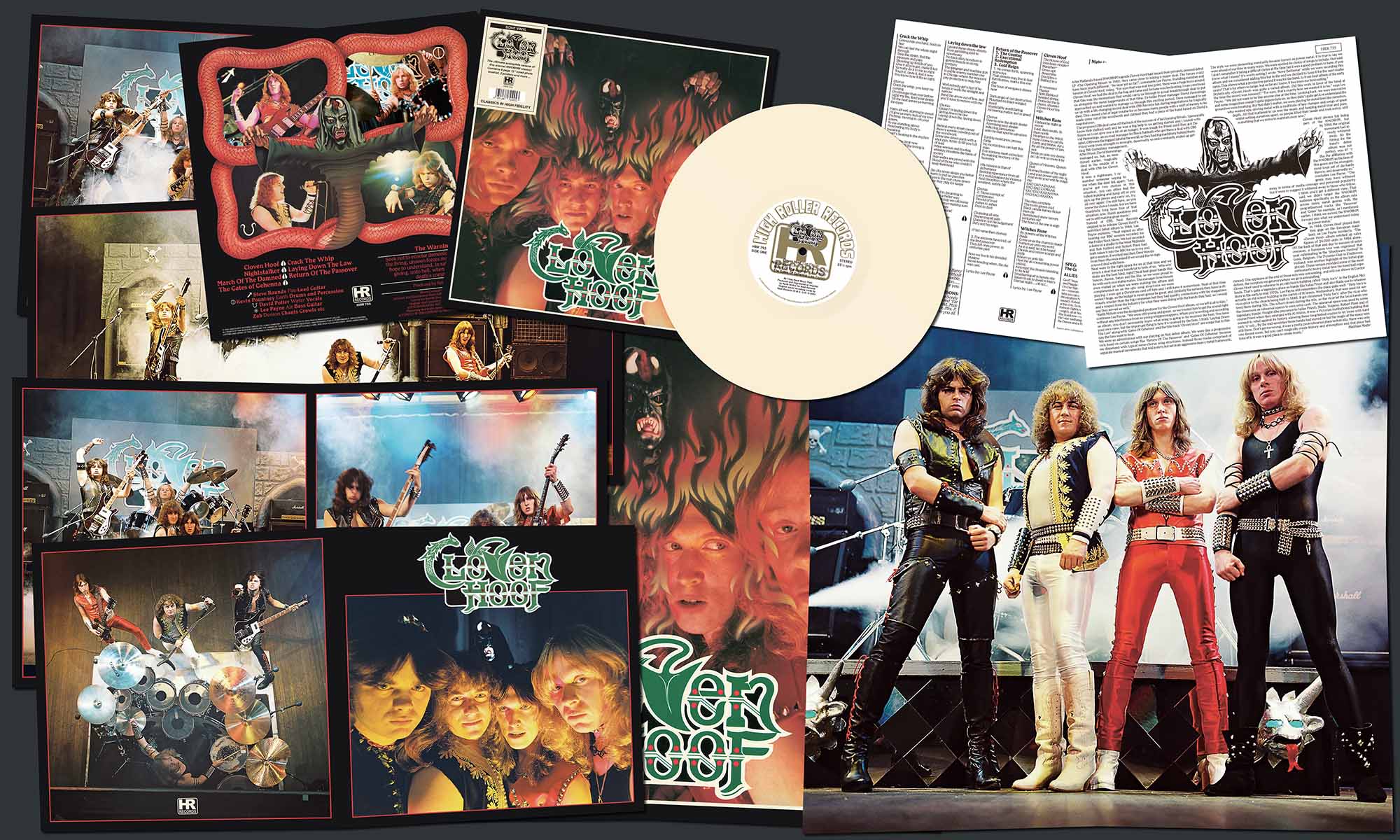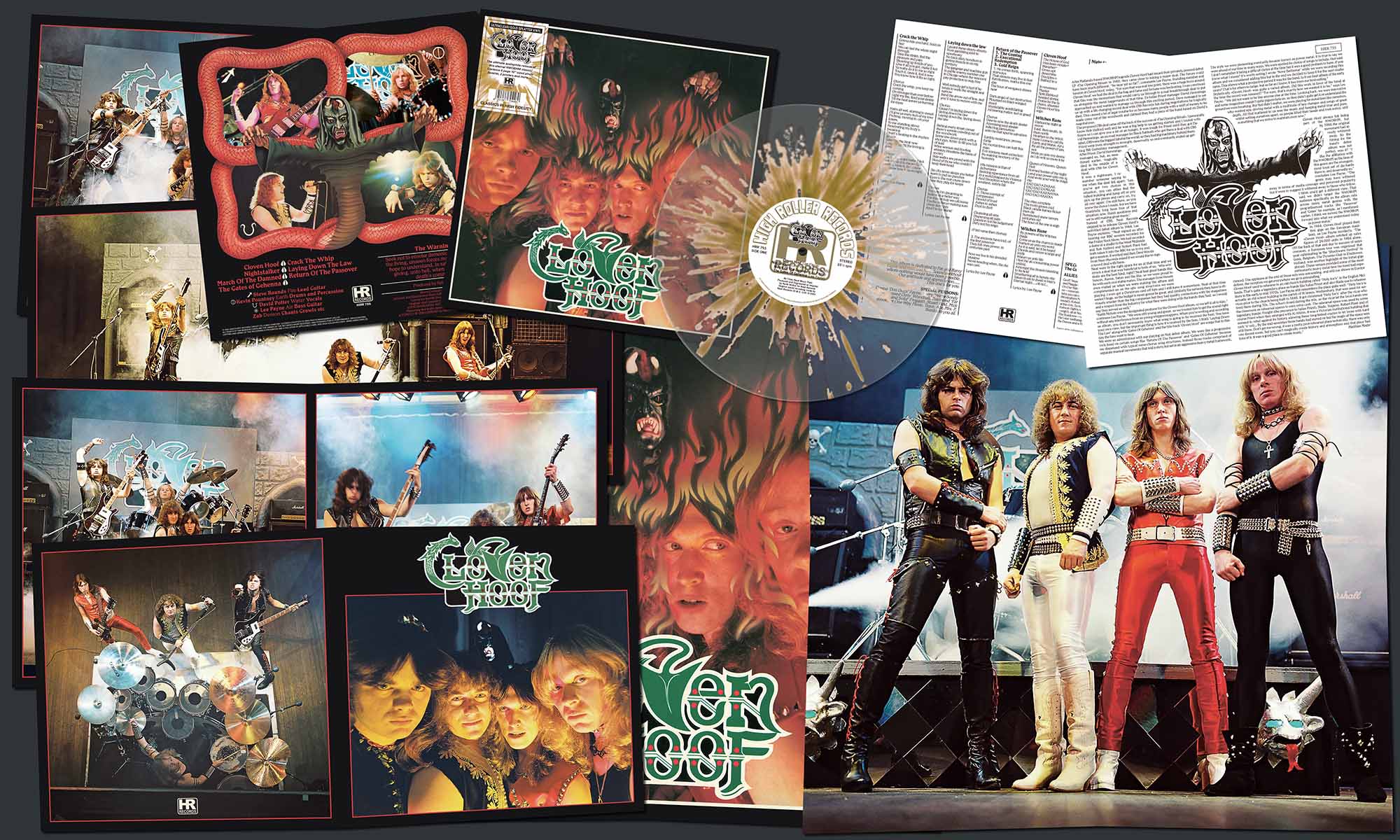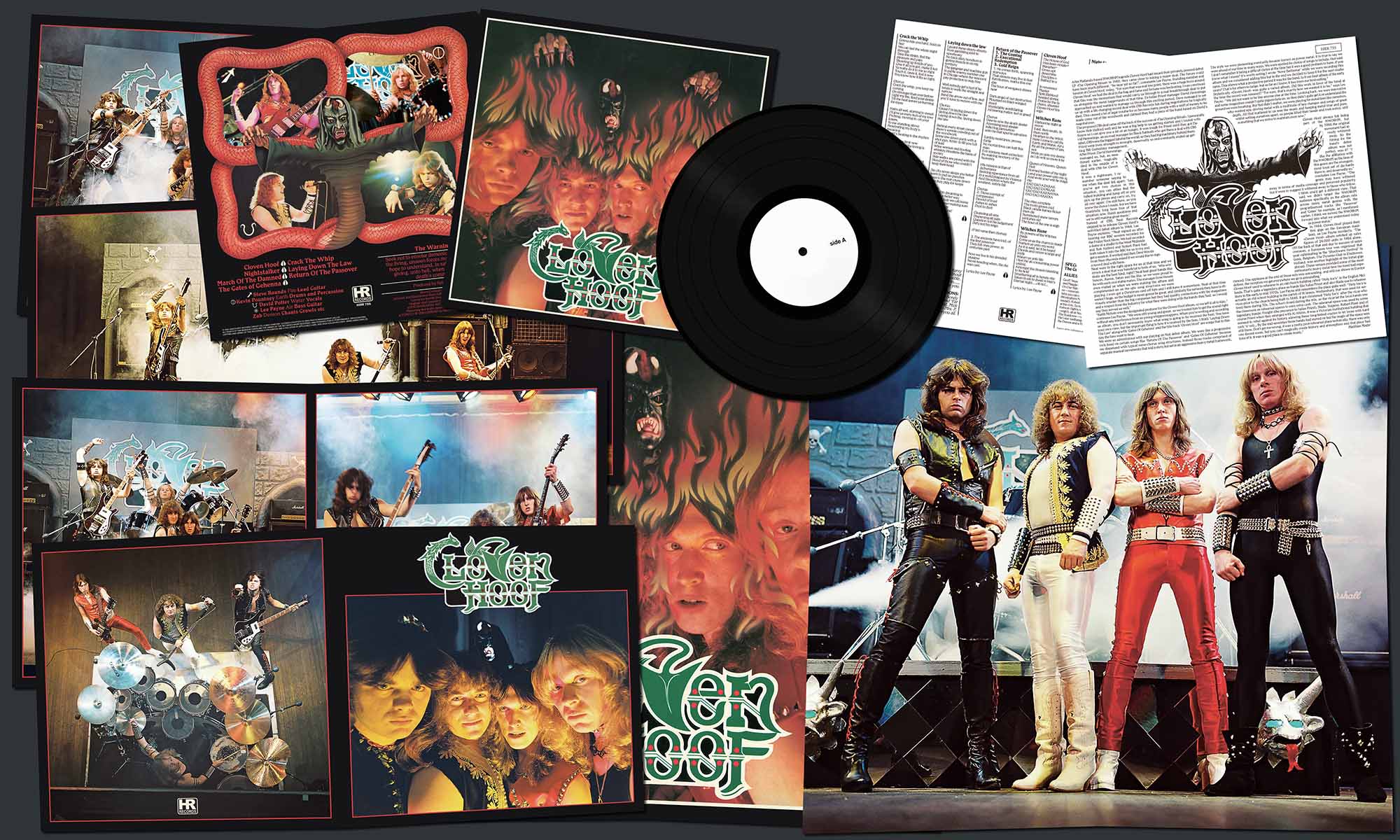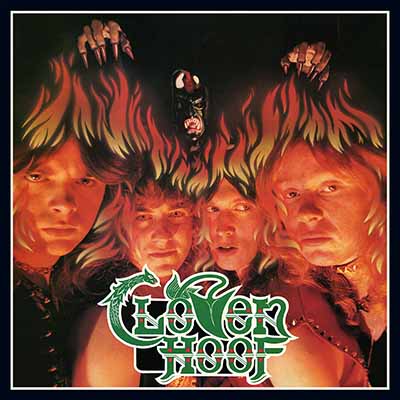 | ||||
| CLOVEN HOOF - s/t LP | |
HRR 755, ltd 1000, 300 x black, 400 x gold, 200 x bone + 100 x transparent ultra clear with gold splatter (HRR Mailorder exclusive), 425gsm heavy cardboard cover, 2 posters, lyric sheet printed on uncoated paper, 8 page photo booklet | |
| David Potter - vocals Steve Rounds - lead guitar Lee Payne - bass Kevin Pountney - drums and percussion Zab - chants growls etc. | |
| 01 Cloven Hoof 02 Nightstalker 03 March of the Damned 04 The Gates of Gehenna 05 Crack the Whip 06 Laying Down the Law 07 Return of the Passover | |
AVAILABLE | |
Original transfer by Marcus Mossmann at PHONOGRAPHIC ARTIFACTS in March 2017.
Mastering and audio cleaning by Patrick W. Engel at TEMPLE OF DISHARMONY in March 2017 / January 2020. Cutting by SST Germany on Neumann machines for optimal quality on all levels...
The ultimate audiophile reissue of this eternal NWOBHM classic!
After Midlands-based NWOBHM legends Cloven Hoof had issued their privately pressed debut EP »The Opening Ritual« in 1982, they came close to inking a major deal. The future could have been much different. “So near yet so far!”, comments Lee Payne, founding member and bassist of Cloven Hoof, today. “For sure that was real low point, there was a huge buzz around Cloven Hoof, we had the deal in the bag and fame and fortune was beckoning. I was convinced that this was the momentum that would carry us through to a real breakthrough deal to put us alongside the metal juggernauts of that time. Ex-Judas Priest manager David Hemmings approached us and wanted to manage us through this exciting period. Dave managed to set us up with a life changing record deal with CBS Records but during negotiations he tragically died. This caused a lot of legal trouble for us because many people with a sniff of money to be made came out of the woodwork and claimed they had a piece of the band based on David's negotiations.
The proposed CBS deal came off the back of the success of »The Opening Ritual«. I personally know Rob Halford well and he was a big help to us getting started and I toured with Saxon so I can give you a bit of an insight. It was tough for Priest until they got David Hemmings, an ex-road manager for Black Sabbath who got them a deal with CBS label. CBS were the biggest label in the world, so they had big machinery behind them. Priest went from strength to strength, deservedly so and eventually ended up getting Bill Curbishley management. After Priest, David Hemmings managed us, but, as mentioned earlier, tragically died in the middle of a deal with CBS for Cloven Hoof.
It was a nightmare, I remember someone saying to me when the deal fell apart: ‘Lee, you’ve got two choices in this situation, you can either find the tallest building and jump off or you pick up the pieces and carry on, try all over again’. I’m still here, so you know the choice I made, but we have thankfully long been free of that situation now, thank goodness and we’re still making great music.”
Instead of CBS, Neat Records stepped in to release Cloven Hoof’s self-titled debut album in 1984. Lee Payne explains: “Neat signed us after hearing our BBC session recorded for the Friday Rock Show. We had recorded a demo at a studio in the West Midlands and Rob Halford and Robert Plant had both taken it into the BBC for us to try and get a session. It worked and then Dave Woods from Neat rRecords asked if we would like to sign a record deal with them.
Neat were in the right space for us at that time and we struck a deal that was beneficial to both of us. ‘Win-win’ deals are the best kind, right? Neat had great bands like Venom, Raven, Satan and the like, so we were proud to be with such cool stable mates. The manager from Venom even visited us when we were making the album and complimented us on the epic song structures we were playing. I even got a Christmas card off him and I still have it somewhere. Neat at that time weren’t huge, so the budget is never gonna be great, and similarly the network they have is obviously smaller than the big companies but they had quality connections with the magazines and a respect from the Industry for what they were doing with the bands they had, so I would say they served us well.”
“Keith Nichols was the designated producer for the Cloven Hoof album, so we left it all to him,” continues Lee Payne. “We were still young and green, so we trusted him to get the sound right without any interference from us young whippersnappers. When you’re writing and recording an album, you don’t necessarily know what song is going to be received the best. You have your own view, but the important thing is how it’s received by the fans. I think ‘Laying Down The Law’ along with ‘Gates Of Gehenna’ and the title track ‘Cloven Hoof’ are songs that to this day the fans want to hear.
We were so adventurous with our playing on that debut album. We were like a progressive rock band on certain songs like ‘Return Of The Passover’ and ‘Gates Of Gehenna’ because we dispensed with typical verse-chorus song structures. Instead those tracks comprised of separate musical movements that told a story but set in an aggressive heavy metal framework. The style we were pioneering eventually became known as power metal, it is true to say we were ahead of our time in many ways. We were spoiled for choice of songs to include, that said I don’t remember it being a difficult choice at the time but it was a good problem to have, if you know what I mean? It’s worth noting I wrote ‘Nova Battlestar’ while we were recording this album and we considered adding this but in the end we decided to keep it for the next studio opus. This shows what a productive period it was for the band. Is it our best album of the early years? That’s for others to judge, but as far as I know, it has been our best-selling.”
Stylistically »Cloven Hoof« was quite a varied album. Did this work in favor of the band at the time the record was released? “For sure, that’s exactly how we wanted it to be,” says Lee Payne. “We did not want to be like anyone else at the time. Looking back, we were innovative and some magazines couldn’t quite pigeon-hole us, so they didn’t quite get it or understand the ground we were breaking. But that didn’t matter, we were playing for metal fans like ourselves, who wanted epic driving metal with a multitude of key changes and songs of great depth. All that mattered to us was the music and keeping metal true and pure, whilst setting ourselves apart, so people lifted their heads and took notice, still something that we strive to maintain even now.”
Cloven Hoof always felt being part of the NWOBHM, but by 1984 the original movement had already withered away. So the timing for the band’s debut album was not perfect, was it? “I like the affiliation with the NWOBHM as the fans of this genre are the strongest, most loyal set of die-hards there is, and deservedly so,” concludes Lee Payne. “The genre may have withered away in terms of media coverage and perceived popularity but if were to suggest it withered away to those who follow, I think you’d get a different view. That said we didn’t target the NWOBHM audience specifically as the album cuts across many metal genres with the prog-influenced tracks like ‘Passover’ and ‘Gates’ for example, as I mentioned earlier. I think we moved the NWOBHM forward into what we understand today as power metal.”
In 1984, Cloven Hoof played their first gigs on the European mainland, as Lee Payne recollects: “The »Cloven Hoof« album notched up sales figures of 24,000 units in 1984 alone. Off the back of that and due to success of sales overseas, a European tour was organized that year culminating in the ‘Shockwave Festival’ in Genk, Belgium. The Dynamo Club in Eindhoven, Holland, was another highlight of the initial gigs abroad. These venues provided some of the most enthusiastic heavy metal fans the band had experienced. The applause at the end of these sets was astounding, and still our shows in Europe deliver, the reception we get everywhere we go is astounding.”
Cloven Hoof used to rehearse in an old church building called “Holy Joe’s” in the English Midlands. That’s quite a legendary place as bands like Judas Priest and also Slade use to rehearse there in the early to mid 1970s. Lee Payne still remembers the place quite well: “Holy Joe’s is actually an old school building in the parish of St James, Wednesbury, that was used for services prior to the church being built in 1848. It got christened ‘Holy Joe’s’ after the vicar who lived there during 70s. The school closed during the 60s, so the vicar let the local bands use the classroom as rehearsal spaces to earn extra cash. The rehearsal space was used by some legendary bands: Freight (the precursor to Judas Priest), Slade, Trapeze, Robert Plant and of course Priest when they emerged with Al Atkins. It was a Victorian institutional building that seemed to rebel against its history allowing these long-haired crazies to let loose with hard rock ‘n’ roll... By the mid-seventies those bands had moved on but the magic of the space was still there. Don’t get me wrong, it was a pretty poor rehearsal place technically, there was only one decent room, but you can’t magically create history and atmosphere and that place had tons of it, it was a good place to create music.”
Matthias Mader
